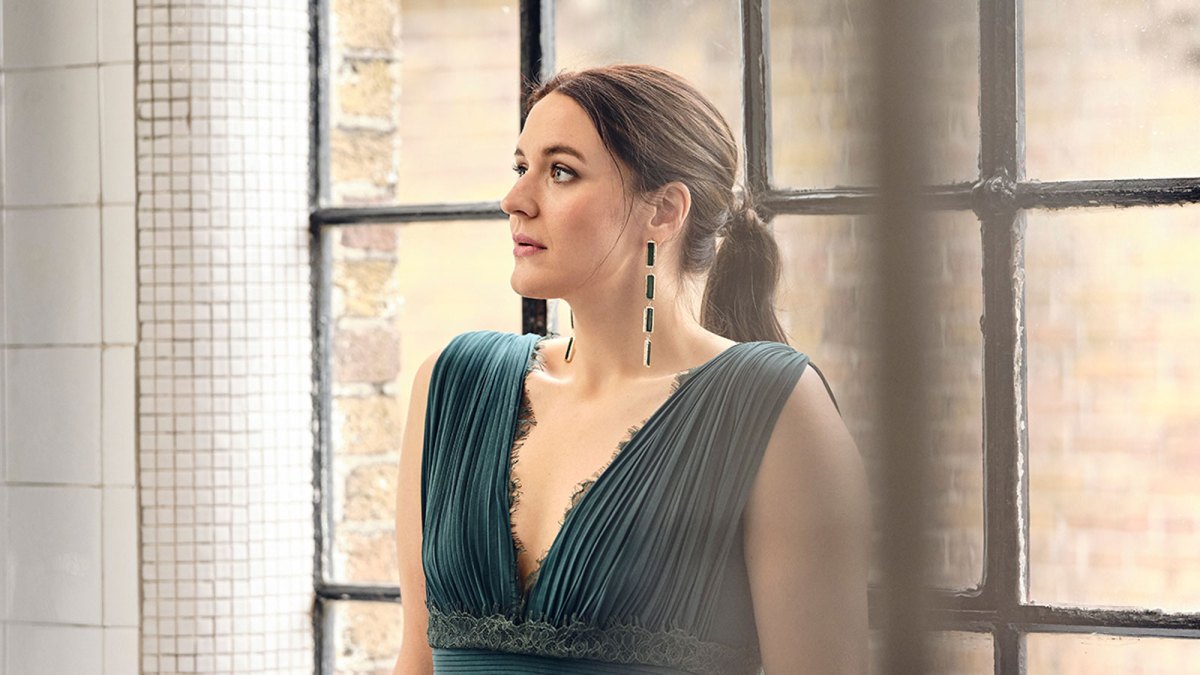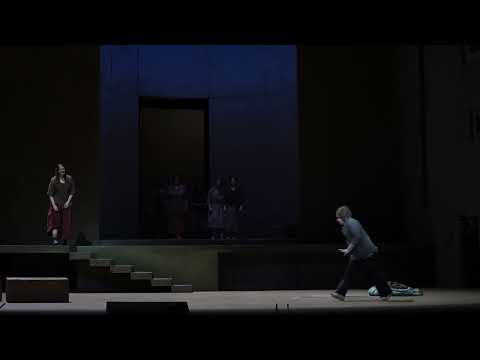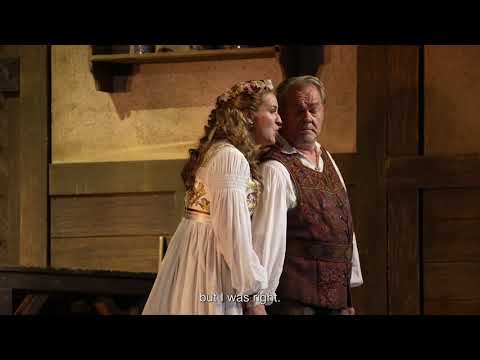Opera is often a long game. Voices take time to mature (which is why so many 40-something singers play teenage lovers). Singers also face pressure to commit to a career early on in order to get into the right schools and study with the right teachers. The economics of an opera house or major recording label often leave excellent voices plugging away at their craft in regional houses and small-but-scrappy labels until the full package comes together.
Which is why fans love a story like Lise Davidsen’s: Born in Stokke, Norway (a city with a population of just over 11,000) to a healthcare professional mother and an electrician father, Davidsen didn’t see her first opera (“Der Rosenkavalier”) until she was 20. Until then, she preferred to sing Eva Cassidy and Bonnie Raitt. She initially studied Baroque choral singing as a mezzo-soprano before pursuing a master’s in Copenhagen, where her teacher informed her she was a soprano who belonged in opera. In 2015, she was catapulted onto the international stage after winning back-to-back at the Queen Sonja and Operalia competitions. Peter Gelb called her “the vocal flagship of the Met in the decades to come” and told NPR earlier this year, “She basically has the key to the Met.”
Recently, Davidsen returned to the Bayreuth Festival, both for the company’s new “Ring” Cycle (in which she sang Sieglinde) and a revival of Tobias Kratzer’s meta-production of “Tannhäuser,” which casts the title role as a Wagnerian heldentenor torn between a career in opera with his costar (Elisabeth) and life on the fringes of society with a fiery activist (Venus). Kratzer’s staging, which includes live videography from backstage, presents Davidsen’s Elisabeth as a character overwhelmed by emotions, but also attempting to take control of her own life. Rather than fainting into her death at the end, she kills herself in a highly visual and visceral manner. It casts an uncomfortable but necessary shadow over the idea of “Heilige Kunst,” or holy art.
I met with Davidsen the afternoon following her third performance of “Tannhäuser” at Bayreuth’s Wagner Museum. We both thought it would be a great way to escape the heat waves that gripped Germany this summer. We both forgot that the best place to get recognized by fans in Bayreuth would be at the Wagner Museum.
VAN: What’s it like being back in Bayreuth this summer?
Lise Davidsen: It’s been really nice. 2019 and 2021 were two very different years due to the pandemic. So that changed a lot.
Does this feel more like 2019 or 2021?
Oh, 2021, definitely. I don’t think we’ve adapted to the world of socialization, meetings and things like that. But it’s really nice. Especially the “Tannhäuser” team and its spirit. It’s still a big part of not just my career, but my life.… It’s definitely one of my favorite productions. Of course, I have done it three times—I haven’t done many productions over and over again. Even so, I think Tobias really nailed it with this one. There are certain things you just can’t know. You can’t know, with the singers you’re presented with, if the ideas will work the way you think they will work.
It’s funny that you’re saying this in front of one of the rat costumes from Hans Neuenfels’s “Lohengrin.”
Yeah! [Laughs.] I think you can’t really know if it will read the way you think. I’m not a stage director, but I feel that’s sort of the key thing for me, as a singer: How can I make these ideas live? How can I make them come alive and be what he thinks it should be?
In an interview with the Deutsche Oper, you said of Sieglinde that she doesn’t really live, she just exists. What strikes me about your Elisabeth in this production is that she’s very proactive.
I think what I meant in that interview about Sieglinde—and this is tricky in opera—you sort of go in in media res, straight into [the action]. So you don’t get to see where she’s coming from or where she’s going. You meet her in this hold of men. And I have done “Tannhäuser” productions where it’s the same: where Elisabeth is a figure, a symbol of the clean, the pure, the virginal. And, of course, that’s one way that she is. But she’s so much more, like we all are. And I think that comes through in this production. I even find Wolfram to be a much more interesting character [in this staging]. He’s a bigger contrast to Tannhäuser. He’s not just the good guy, you know, “I’m doing all the good things.” You can still see how kind and well-meaning he is. But it’s also about power.
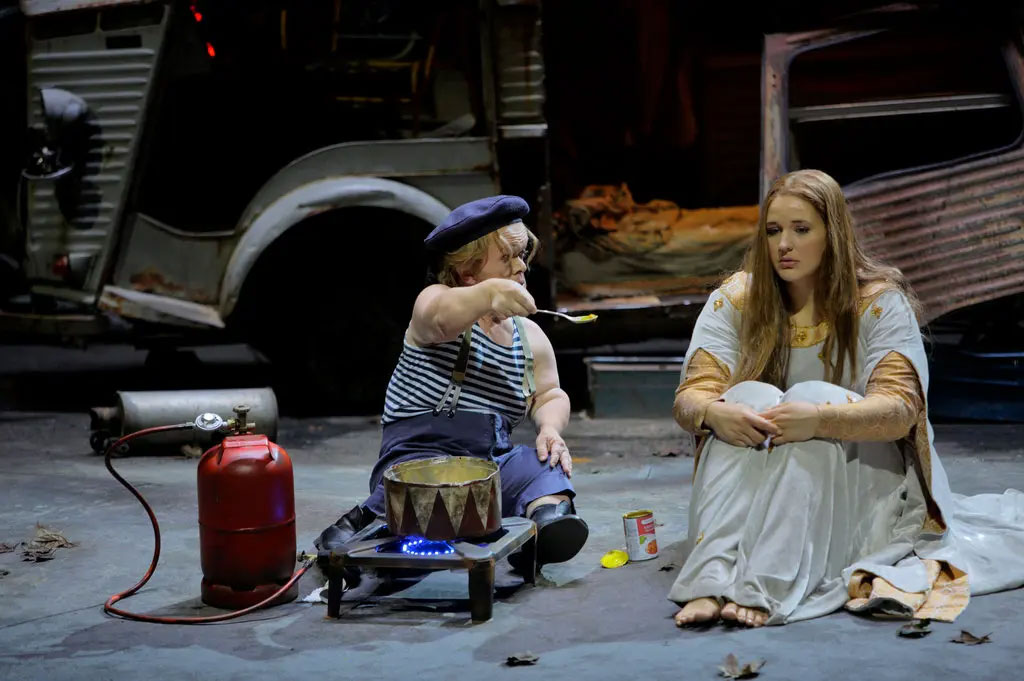
And moral power. At different points, you’re on Wolfram’s side, you’re on Venus’s side, you’re on Elisabeth’s side—there isn’t any black-and-white.
Yes, exactly. I don’t know if that’s what Wagner had in mind…[but] I think it’s easy to say that he wanted it to be: “This is the pure, this is the bad. This is sex and this is virginity.” Very black-and-white, like chess pieces. Sometimes I find that, in some odd way, that’s the point of opera: that we present these different parts. But that’s not the same as we are [in real life]. We are both these parts. And I think we see that in this Elisabeth and Venus. We see that Venus was not just bad, and Elisabeth was not just stupid and naive.
What struck me in this production was Venus’s reaction to seeing Elisabeth’s body at the end. You see real regret and shock on her face, as if she’s realizing her actions have consequences.
With my friends and family, we’ve all had these discussions where you can understand why something else is attractive, because it’s not what you have and it’s not what you can give. And you cannot really fake it. Or you can fake it and be a bit crazy for a couple of days, but it’s not really you. I can say, “Yes, I love being social!” But I can’t do it forever, because it’s not me.
People say to me, “Oh you must be seeing the world!” No. I see the hotel and I see the opera house. And, of course, that’s my dream, but it’s not as free and crazy as it might look. We don’t know where to go grocery shopping! Whenever you come to a new city, you have to find what we call in my home country “the natural things.” The boring things: Where do I wash my clothes? Where do I buy my food? How do I get from A to B?
And “Tannhäuser” doesn’t deal with that directly, but I think [this production] is sort of saying that the opera world is not enough [for Tannhäuser]. He at least needs to check out the other aspects of the world before he makes his final decision: where he wants to be and with whom.
In many ways it’s Wagner’s own personal history—
—with his women.
And even his politics. There’s that quote in the production (“Free in willing, free in doing, free in enjoying” from Wagner’s The Revolution) that Venus interprets as something quite liberal. But then you see how others have used Wagner’s image towards their own agenda…
Yeah, this idea of: We want to be free, we want to be able to choose and do whatever we want—it doesn’t always work like that, does it? Even in a relationship, there are things we have to take into consideration with what we’re given and what we have. And that is hard work. I love opera, I love singing, I love so many parts of this [career]. But it’s not like every day is a dream come true. [Stopping in front of a fan with Wagner’s portrait painted on it.] It’s interesting what becomes important when we die.
Have you read Alex Ross’s book on Wagner?
No.
He has one section on Wagner merchandising that includes a Rhinemaiden bathtub.
Well… Some people need to have a break from opera, too.
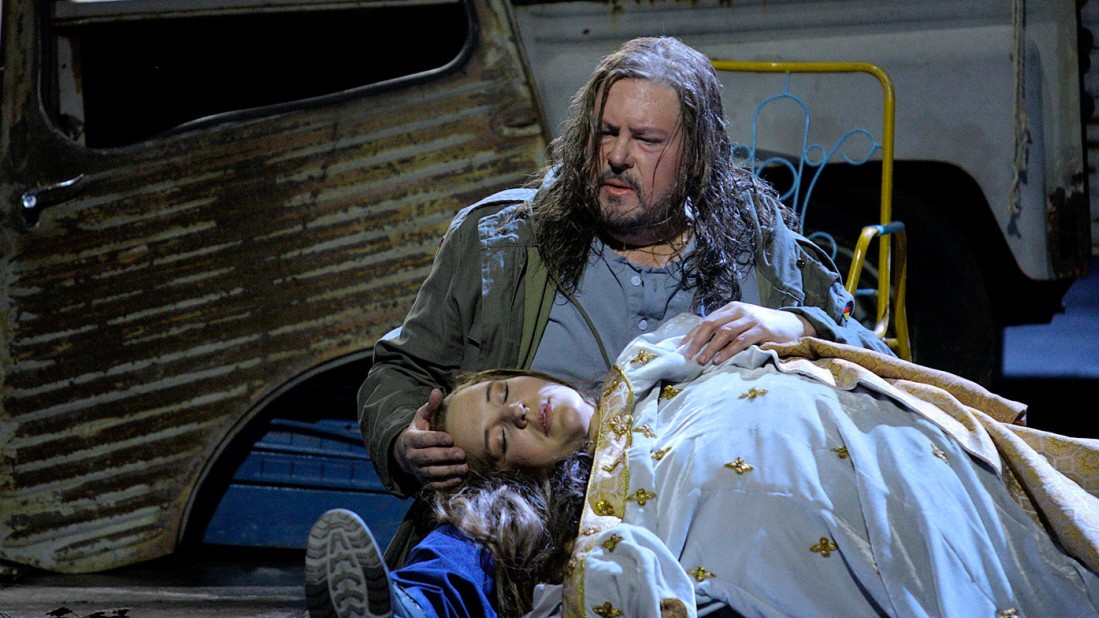
I think that ties in with your own biography; one of the things that’s shared most often in profiles of you is that you didn’t see your first opera until you were 20.
Yes, I’m sort of a late bloomer in this world. So maybe in 20 years’ time, I’ll be one of those who says, “Well, it’s perfectly natural to have a Rhinemaiden bathtub.” I do have a kleiner Wagner—my boyfriend bought it for me.
With the costs of music education, it’s increasingly becoming an anomaly to not come from a musical family.
I say this all the time, but if it were not for the Norwegian system, I would never be a singer. My parents could not afford the education, so the state paid. If it wasn’t for that, [shrugs].
A fan stops us to ask for a photo with Lise (who happily obliges), which brings us to the topic of social media.
I really want to be there, especially for younger [singers asking] about how to get started. I really want to answer their questions and give advice, but then it’s just so many opinions. And I’m not strong enough for having so many opinions first thing in the morning!
I think we’re about the same age, too, where we had the internet growing up, so social media makes more sense. But we didn’t grow up with social media, so we also have a bit of an outsider’s perspective compared to younger generations.
I’ve heard from colleagues who say, “Yeah, but it’s so revealing!” No, no, no. You choose, my friend, what you want to put on there! If you really look, you see very little of my private life on Instagram. But I believe that people follow me for what I do. If I constantly share these “What am I doing” [posts], I lose me. So I just decided, Well I can’t do that. I mean, Anna Netrebko, she Instagrams every moment of every day in her life. And then you have others who share: [robotically] “I will be here tomorrow.” There are many options between the two.
Do you feel pressure to create a persona or a narrative around your career?
I have been very clear about what I want from the beginning, because I took time to find out what’s right for me. I have been very clear about not making me a Wagnerian soprano from the age of nothing; very clear about calling it “lyric-dramatic soprano” instead of “dramatic.” Maybe less so now, but five years ago, it was like, “Come on, I have time before I need to label it down that much.” I think I have wanted to go with the roles I’ve been doing and the places I’ve been, much more than creating an image I can’t live up to.
I think the competitions that I did made it easier for me. They turned everything upside-down and then I was just who I was, in a way. There wasn’t that big of a need to create this thing and present it. So maybe that has been the main reason that there hasn’t been a need for me to “be something” more than what I do. Which I’m very happy about.
Is it true that you considered giving up on a singing career in conservatory?
Yeah, with my teacher in Copenhagen. She was that sort of teacher who changed everything, and is today the reason I have my technique. But she was quite harsh in the first meeting. She spoke for 45 to 50 minutes, which is quite long when you think you’re supposed to [be there to] sing. I recorded the lesson and listened again to the recording, and she said really good things to me. She was the first one who said I belonged on an opera stage—I was singing Baroque music at the time. But she also said that I didn’t really take care of myself; my support, my posture, everything needed to be better. And I think at the time, I was like, OK, if I have to do all of these things, I’m not strong enough. Because I just cried and cried and cried. I was so sad and so upset. And so shocked, because I came here like, Now you’re going to hear a mezzo-soprano who can sing Baroque! And she was like, “You’re not a mezzo.” I think there was that sort of contrast of expectation versus reality. I didn’t even want to be an opera singer. And everything turned upside-down and it was too much for me.
So I called my mom, which I did a lot at the time—every time it was hard—and she said, “Well, maybe this isn’t your thing.” She didn’t mean it in a giving-up way; we don’t give up easily. I think she was more like, “OK. This is the great teacher who can help you. If this is so hard, then maybe this isn’t the right life.” I don’t know what it was [that changed my mind], to be honest. My teacher also said that I had a good voice, so [I reasoned], Well, if I switch now and sing to my full potential and that doesn’t work, then I’ll stop. And so I went back and studied with her for four years. It ended well. To this day we have a very professional relationship. I care so much for her, and she’s given me all this technique. But she’s very strict. She had her opinions. I decided every hour I went to her, I’m going to take this and this, but leave all the other parts. Her opinions about how I look—that’s not why I’m here. That I can learn from other people. I can develop that on my own. But actual technique? She was perfect for me. It was a weird environment to be in every week, but I think I found a way.
The latest from VAN, delivered straight to your inbox
By what you look like, do you mean physical appearance or how you were carrying yourself?
It was everything. It was what I looked like: I needed to do more gym. I needed to get my posture—because I came in like this [walks casually, a little slumped], because I was so shy and afraid. I was just going into a room to sing, I didn’t know how to be the whole [snaps] shebang. So yeah, it was literally everything. I think she also said, “Well, you can’t go back to church singing.” I think she thought I’d started singing Baroque music due to religion. But it was just because I love Bach!…To this day, I don’t feel well thinking about those hours with her. I was there to sing, not to be analyzed like a robot or machine. Pages of “by the way, this is what’s wrong with you.”
Do you think part of that was coming into opera later on? I’ve heard from younger singers that they get used to dealing with this early on with their teachers.
Yeah, I think [it’s] also social media. That’s where our generation is different to the younger generations, because they’re used to getting shit more than we were. At least than I was. But again, it shouldn’t be like that. Can’t we just be and leave what we look like aside?
But I think you’re right; I think they are more used to the “product” that we always talk about. I’ve spoken with a mental trainer who works with the Olympic team in Norway. I said, “I feel so sort of torn when I’m Lise onstage, then Lise in private, or with friends, then I come home and…” I think everyone has that, but at some point it was so strong for me. And she was like, “Well, the more you can combine these personalities, the easier your life will be so you don’t have to change all the time.”
And I think that’s under-communicated with younger people today, because the personality is what we want, too. We want to hear what you have to say. We want to see you. We don’t want to see you pretend to be someone else. But that’s hard…I’m glad I’m 35 and not 25 now.
You’re someone whose entire personality isn’t opera. But you also sing Wagner, who has perhaps the most intense fanbase within opera. Has that ever clashed for you?
It’s surprisingly easy, actually. You never talk about Strauss that way. But I know a couple of friends from Norway came [to Bayreuth], and it’s like a bucket-list thing: They stay in this hotel. They take the bus up to the Hügel. At intermission they talk about the show. They talk about it on the way down. They have a drink, go to bed, have breakfast, and they start the discussion again. But that’s part of the whole thing, you know? The devotion to it is so unique, and I think that is one of my favorite parts. It sounds crazy, but I mean, the audience is why we’re here, so it’s also nice that they are so interested in it. Some of them know the “Ring” much more than I do. And then they ask these questions and you go… [Laughs nervously.] “Can you ask me about the aria instead?”
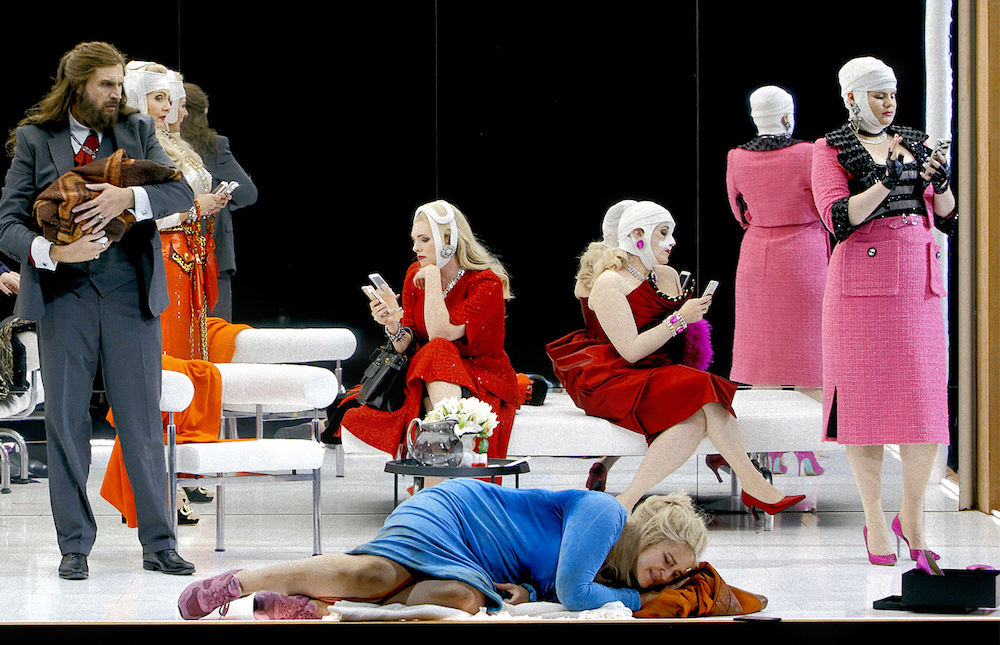
The initial run of the “Ring” here at Bayreuth was postponed due to COVID. What were the early lockdowns like for you? Because it also came right at this moment where it seemed like your career was reaching this very high escalation point.
And then crash, bang! I think it was quite overwhelming for everyone. But for me, it was necessary, in a way, to get some perspective on what was actually going on. Because the speed was quite high and has been ever since. But I know more now about how I’d like my future to be planned, rather than keep running after it.
Such as?
I think I will try to do the roles I want to do, but then maybe calm it down a bit. All my roles are new; that’s the main thing. I need time to study these roles. I need time to get to know them. It takes time for my voice, too. It’s been so crazy. I was supposed to do “Meistersinger” in concert and “Elektra” in concert. And then because of COVID—boom!—it was two role debuts at the Met. And it’s like, “Since when was that planned?”
Of course, I’m grateful for that, but it leaves no room for my private life. I can’t see my family. I see no one, I’m just at the opera. I don’t want that forever. So it’s more about—I don’t think the audience will see it, but I will feel it. I’m trying to make a tiny bit more space between productions rather than going from one thing straight into the next. A concert is eight hours in the car. The other day, I was in Norway and then went to Finland. And then my flight was canceled, so I had to book a new flight from Munich. And then to get to Munich I had to take three trains, like, are you freaking kidding me? I know that Bayreuth is in the middle of nowhere, but this is just next-level.
And right now because COVID is still going on, every train you take is—
Yeah, a gamble. [Pointing to some Valkyrie jewelry from the first “Ring” at Bayreuth.] This is my favorite.
I think that’s always what appealed to me most as a young girl with opera: the costumes.
I like that I can be someone else for a couple of hours.
Are there things in a production or a director’s vision that you don’t like doing?
Not really. If there’s something I don’t understand, then I will discuss it. But I haven’t been in a situation where I’ve had to say no. When I did Stefan Herheim’s “Ring” in Berlin, we had a long discussion about establishing this kid between Sieglinde and Hundig, and then when Siegmund takes out the sword, she’s supposed to kill this kid. I did it. It was his choice. It was more about trying to see how she does that—for me, Sieglinde would never do something like that.
It was more of a character question rather than a personal question. I would never be naked onstage just to be naked, but if you can give me a good reason—then I’ll do it.
Is it more interesting to do those sorts of productions compared to something like the Met’s “Meistersinger,” which is very by-the-book traditional?
The key thing is that [“Meistersinger”] is old, so you’re not a part of the process of making it. Which can get a bit tricky. It’s fun to do, but it is more fun to do a new production. Not just because it’s new in terms of the concept, but because you are there when you create it. You understand it more, because you can get that insight.
Have you learned or noticed anything different about Elisabeth having now sung it three times here in the same production?
I think it sort of develops every time you do it. You get more and more layers in a way. And I think this production opens up so many aspects of her life. Sometimes you have to do that work yourself in a way. Like, what else is she? Like if you do an Otto Schenk production, it still has all this, it’s just less clear.
Is it tougher with Sieglinde because her story is a smaller aspect of the “Ring”?
Well, in this “Ring,” I look at it as walking into this huge land of Wotan. He has it all, he’s like this religious leader. He’s not only in power, he’s created his own little world. So Sieglinde is free within this world, in a way. I mean, she’s miserable: She’s pregnant, she’s been raped, it’s not like she’s a light character or anything. But she dresses up, she cares…At least she can pretend like she has a life. And then it develops from there.
But it’s interesting. The destinies [between Elisabeth and Sieglinde] aren’t necessarily the same, but then again they are. One is for love, one is for survival. But maybe that’s also the same. It’s this weird crossover. And I think they both just want to be at ease. Of course, Elisabeth could, in 2022, go see a shrink, but this emotion that she’s dealing with is so strong that she can’t see clearly. And for Sieglinde, she’s literally running away, so there’s no time to seek help or find a different way out, no matter what time we’re in. It all comes down to the production, how dimensional these roles can be.
What’s an ideal production process like for you?
As long as there is respect, I am very open. It’s hard to explain, but as soon as people start to think that they can either mess around with my time or the fact that I try my best, or if they start being too condescending, then I have a tendency to be not so kind. [Laughs.] Which is not really good, I work on that every day. But I have seen over time that the directors and conductors I work best with are those who respect me. I know that in opera you need the hierarchy. But I still need to be respected…and [shown] that my time has value.
Not to flatten stereotypes but that sounds very Scandinavian.
Yeah, I think that’s true, and I think that’s where I clash with other cultures, too. Because people think I’m way too straightforward. But this for me is such a basic thing in working together. The fact that I ask a question or that I say my opinion, that has nothing to do with disrespect. In England, I have to say, “I’m really sorry, but could we—maybe—think about…” You have to say “sorry” 15 times. In America I have to go, “Oh my God, that’s amazing, but I was just wondering…” I have to train myself. But if I don’t do it [at all], I always end up being so frustrated.
Most often I do feel respect, so it’s not like it’s a problem. I think as long as there is communication and there is room, then I’m fine. I don’t need to be lifted to my dressing room and told “Oh my god, what a wonderful job you did today, Lise.”
Do you still sing Bonnie Raitt?
No. Although I don’t think anyone’s sad about that. [Laughs.] ¶
Subscribers keep VAN running!
VAN is proud to be an independent classical music magazine thanks to our subscribers. For just over 10 cents a day, you can enjoy unlimited access to over 875 articles in our archives—and get new ones delivered straight to your inbox each week.
Not ready to commit to a full year?
You can test-drive VAN for one month for the price of a coffee.

